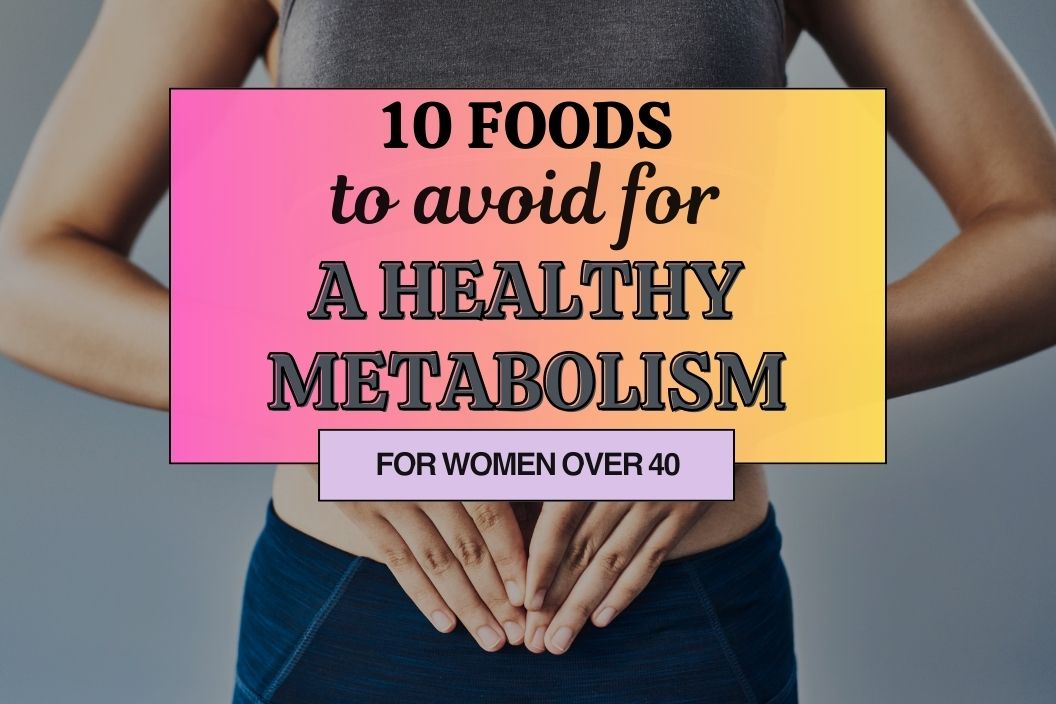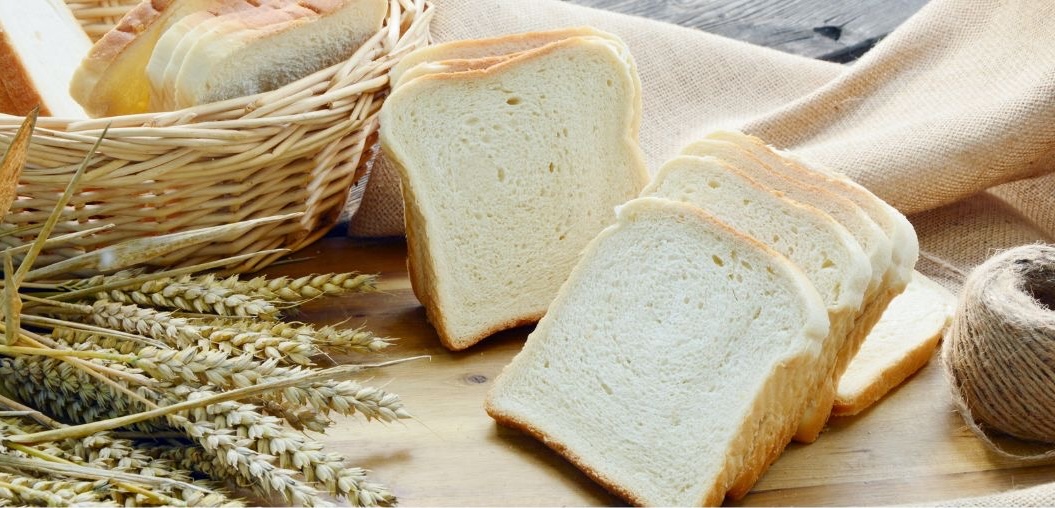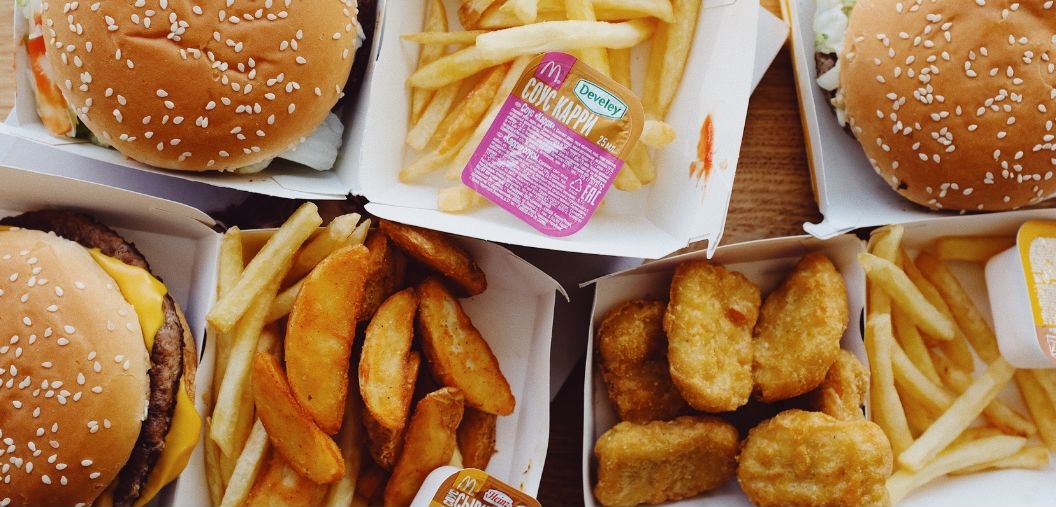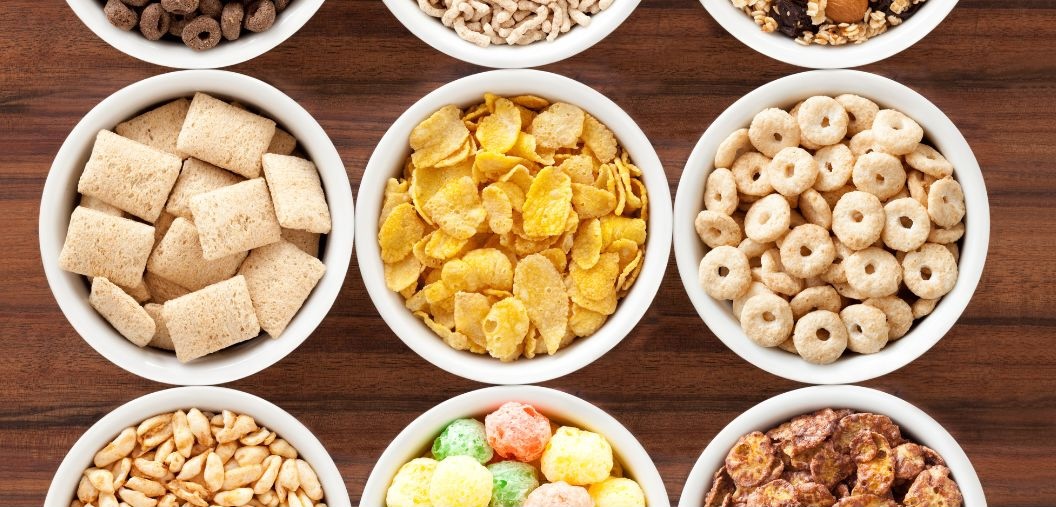
As women hit their 40s, maintaining a healthy metabolism becomes more challenging.
Hormonal changes, lifestyle shifts, and a natural decrease in muscle mass can all slow down your metabolic rate, making it easier to gain weight and harder to lose it.
But don't worry—by avoiding certain foods, you can keep your metabolism humming and support your overall health. Let’s dive into the 10 foods you should steer clear of and discover some healthier alternatives that will keep you feeling vibrant and energetic.
If you’re curious about which foods and spices can help boost your metabolism, check out this article: Ways to Boost Metabolism and Food List for Women Over 40.
1. Sugary Drinks (Including Fruit Juice and Soda)

Sugary drinks like soda and even fruit juice might seem innocent, but they can seriously mess with your metabolism. These beverages are loaded with added sugars, which spike your blood sugar levels and contribute to insulin resistance—a key factor in metabolic syndrome.
This can lead to weight gain, particularly around the belly.
Healthier Alternative: Instead of reaching for sugary drinks, try water, herbal teas, or even whole fruit, which provides fiber to help regulate blood sugar levels. If you’re craving something sweet, a small piece of dark chocolate can satisfy your sweet tooth without the sugar rush.
2. White Bread and White Rice

Refined grains like white bread and white rice are stripped of their fiber and essential nutrients. This means they cause a quick spike in blood sugar levels, followed by a crash that leaves you feeling tired and hungry.
This cycle can lead to overeating, weight gain, and a sluggish metabolism.
Healthier Alternative: Swap these for whole grains like brown rice, quinoa, or whole wheat bread. These options are rich in fiber, which aids digestion, keeps blood sugar levels steady, and helps you stay full longer, making them a good idea for maintaining a healthy weight.
3. Fast Food and Fried Foods

We all know fast food isn’t great for our overall health, but it’s especially harmful to your metabolism. Foods like french fries, hot dogs, and fried chicken are high in unhealthy fats, which can increase cholesterol levels and lead to high blood pressure. They’re also packed with extra calories, which can contribute to weight gain and a slower metabolic rate.
Healthier Alternative: If you’re craving something savory, try making your own baked sweet potato fries or grilling lean meats at home. These options give you the flavor you love without the unhealthy fats and extra calories that can harm your metabolism.
4. Processed Meats

Processed meats like hot dogs, bacon, and sausages are often high in unhealthy fats and sodium. Eating these regularly can increase your risk of developing health problems like heart disease and metabolic syndrome, both of which can negatively impact your metabolism.
Healthier Alternative: Choose lean proteins like chicken, turkey, or plant-based options like tofu and beans. These protein-rich foods support lean muscle mass, which is essential for keeping your metabolism in check as you age.
5. Sugary Breakfast Cereals

Many breakfast cereals are marketed as healthy, but they’re often loaded with sugar and lack essential nutrients. Starting your day with a sugary cereal can lead to a mid-morning energy crash and cravings for more unhealthy foods, derailing your weight management efforts.
Healthier Alternative: A better choice is a protein-rich breakfast like Greek yogurt with berries, a smoothie with leafy greens and protein powder, or oatmeal topped with nuts and seeds. These choices provide sustained energy, support your metabolic rate, and keep you satisfied longer.
6. Artificial Sweeteners

Artificial sweeteners are often promoted as a healthier alternative to sugar, but they can actually do more harm than good. Some studies suggest they may disrupt your gut health and contribute to insulin resistance, both of which can slow down your metabolism and increase the risk of weight gain.
Healthier Alternative: If you need a sweetener, opt for natural alternatives like stevia or honey in moderation. And remember, reducing your overall intake of sweeteners—whether artificial or natural—is always a good idea for maintaining a healthy weight.
7. Alcohol

Alcohol can have a significant impact on your metabolism. Not only is alcohol high in empty calories, but it also disrupts your hormone levels, particularly those related to appetite and fat storage. Drinking alcohol can lead to increased body fat, especially around the midsection, and reduce your body’s ability to burn fat.
Healthier Alternative: To protect your metabolism, limit your alcohol intake. If you do choose to drink, opt for a glass of red wine, which contains antioxidants that offer some health benefits without as much impact on your metabolic rate.
8. Spicy Foods

Spicy foods like chili peppers can be a double-edged sword. While some studies suggest that spicy foods can boost metabolism, they can also irritate the stomach lining, especially as we age. For some, this irritation can slow down digestion and negatively impact metabolism.
Healthier Alternative: If you enjoy spicy foods, try consuming them in moderation and paying attention to how your body reacts. Milder spices might be a better option for keeping your metabolism running smoothly without upsetting your digestive system.
9. Low-Fat or Fat-Free Products

Low-fat or fat-free products might seem like a healthy choice, but they often contain added sugars or artificial ingredients to make up for the flavor lost from removing fat. These additives can spike your blood sugar levels and contribute to weight gain.
Healthier Alternative: Instead, choose whole, natural foods like full-fat Greek yogurt, which is rich in protein and healthy fats that support heart health and keep you feeling satisfied. Healthy fats, such as those found in olive oil and fatty fish, are crucial for hormone production and overall health.
10. Too Much Red Meat

Red meat is a good source of protein and essential nutrients like vitamin D and iron, but eating too much can negatively affect your metabolism. Red meat is high in saturated fats, which can raise cholesterol levels and increase the risk of heart disease. Diets high in red meat have also been linked to a higher risk of developing metabolic syndrome.
Healthier Alternative: Balance your diet with plant-based proteins, lean meats, and fatty fish like salmon, which is rich in omega-3 fatty acids. These foods support heart health, maintain lean muscle mass, and help keep your metabolic rate in a healthy range.
How Metabolism Works and Why It Matters
Metabolism is the process by which your body converts the food and drinks you consume into energy. This energy is then used to fuel everything from breathing and circulating blood to physical activity and maintaining muscle mass. Your metabolic rate, or the number of calories your body burns at rest, is influenced by several factors, including age, gender, muscle mass, and hormone levels.
As women age, particularly after the age of 40, their metabolism tends to slow down. This is due to a combination of factors, such as a natural decline in muscle mass, hormonal changes related to menopause, and changes in lifestyle, like being less physically active.
A slower metabolism means that your body burns fewer calories at rest, which can make it easier to gain weight and harder to lose it.
When Metabolism is Good:
- Efficient Energy Use: A healthy metabolism efficiently converts the calories from food into energy. This supports daily activities, physical exercise, and overall vitality.
- Stable Weight Management: When your metabolism is functioning well, it helps you maintain a stable weight, balancing the calories you consume with the calories you burn.
- Muscle Mass Maintenance: A good metabolic rate supports the maintenance of lean muscle mass, which is particularly important as you age. Muscle burns more calories than fat, even at rest, so more muscle mass generally means a higher metabolic rate.
When Metabolism is Bad:
- Slowed Metabolic Rate: A decrease in metabolism can lead to weight gain, especially if calorie intake isn’t adjusted accordingly. This is often seen in middle age when muscle mass decreases, and physical activity may decline.
- Increased Fat Storage: A sluggish metabolism can result in more calories being stored as fat rather than being burned off as energy. This can contribute to increased body fat, particularly around the abdomen.
- Energy Deficiency: If your metabolism is not working efficiently, you may feel more tired or fatigued because your body isn’t converting food into energy as effectively.
The Importance of a Balanced Diet and Lifestyle Changes
Avoiding these foods is just one part of maintaining a healthy metabolism.
A balanced diet rich in whole foods, including non-starchy vegetables, leafy greens, whole grains, lean proteins, and healthy fats, is essential for providing your body with the essential nutrients it needs to function optimally.
Physical activity also plays a crucial role in boosting your metabolism. Strength training, in particular, is effective for building lean muscle mass, which increases your energy expenditure even at rest. Cardio exercises like running, swimming, or tennis are great for burning calories and improving heart health.
Don’t forget about the importance of enough sleep and stress management. Getting sufficient sleep and managing stress levels are crucial for hormone regulation and energy levels. Chronic stress and sleep deprivation can lead to weight gain and other health problems, so make these areas a priority in your life.
Final Thoughts
As you navigate your 40s and beyond, paying attention to your diet and lifestyle is essential for maintaining a healthy metabolism and overall well-being.
By avoiding these 10 foods and making mindful choices, you can support your body’s natural processes, manage your body weight, and enjoy the best health possible as you age.
Remember, it’s not about deprivation—it’s about making smarter choices that will keep you feeling vibrant and energetic for years to come.



